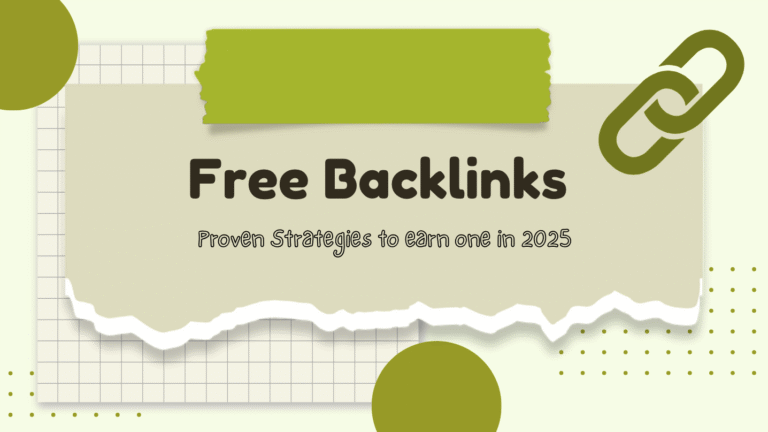With the year now going way beyond the halfway mark in 2025, it’s a suitable time to dig deeper into the analysis of some really good SEO content optimization tools available now.
Most high-performing ones have proven their worth now, making them available at better price ranges. By starting to use these tools this year, you can sharpen your content strategy and stay ahead of the competition.
1. Surfer SEO
Surfer SEO is a powerful platform that helps your articles rank higher on Google and even shows up in AI-powered chats like ChatGPT. It gives you one streamlined workflow to research, write, and optimize content.
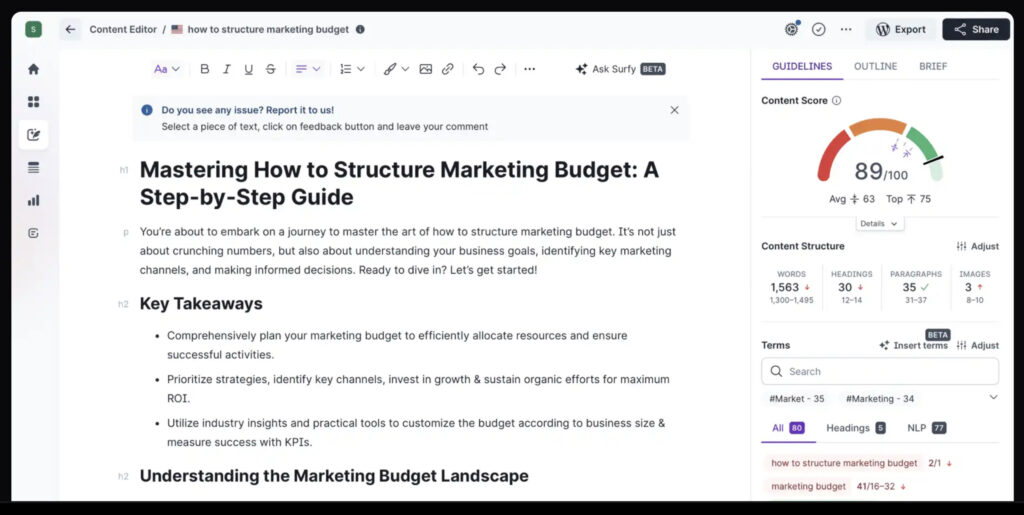
What I like
Surfer has righteously earned its spot. It guides you on structure, word count, keywords, and headings in real time. Surfer provides specific, measurable steps that can instantly improve your content’s competitiveness. The Content Audit feature makes it easy to spot missing keywords or gaps in existing content.
What I dislike
Surfer SEO is limited to keyword research. Of course, it helps you find relevant terms based on search data, but it doesn’t offer the in-depth backlink insights or domain authority tracking you’d get from platforms like Semrush or Ahrefs.
Be cautious against becoming too fixated on Surfer’s Content Score, which can push you to keyword-stuff just to hit the number, sometimes at the expense of natural flow and readability.
And, because Surfer analyzes what already ranks, there’s a risk of your content feeling formulaic, blending into the crowd instead of standing out as truly original.
2. Clearscope
As an overview, Clearscope delivers content optimization powered by NLP and AI-backed recommendations. From grading your content on topical authority to offering readability insights, Clearscope makes your writing more comprehensive.

What I Like
What I love about Clearscope (and what you might too) is the interface. It’s truly intuitive and clean.
The content grading system makes it easy to see whether you’re covering enough relevant terms. Meanwhile, the readability checker ensures your content is engaging and clear for the audience.
The Content Inventory tool pulls in data from Google Search Console to show you where your older content is decaying, so you can refresh it and regain rankings.
What I Dislike
The price is high for freelancers or small businesses. Also, Clearscope doesn’t include many broader SEO features, such as backlink analysis or technical SEO audits. It also leans more toward assisting writers rather than automating content. All in all, it’s still an excellent tool for content optimization.
3. Semrush Writing Assistant
There are great options for content creators and SEO professionals when it comes to optimization tools. And Semrush’s SEO Writing Assistant really stands out. You’ll definitely find value in its integration with the full Semrush suite, especially if you’re already using Semrush for keyword research or competitor insights.
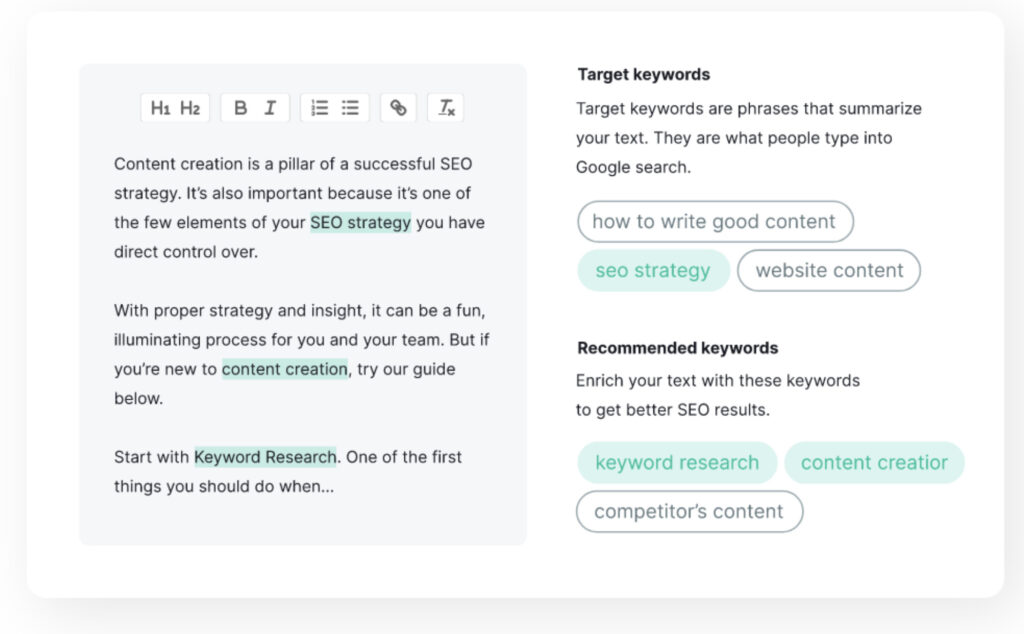
What I Like
What I really like about Semrush Writing Assistant is how holistic it feels. It’s not just checking if I’ve added enough keywords; it actually helps create semantically rich, well-structured content that aligns with user intent.
Because Semrush pulls data from real SERP analysis and competitor benchmarks, the recommendations feel trustworthy and practical. The real-time scoring system is incredibly helpful. It checks for SEO factors like related keywords and content length, but also for readability, tone of voice, and even originality with its built-in plagiarism checker.
And for sure, Semrush’s competitive analysis tools are unmatched. You can see which competitors are getting featured and adjust your strategy accordingly. And for businesses that need to track how their content is showing up in Google AI Overviews, Semrush has add-ons that give direct insights into AI visibility.
What I Dislike
Semrush itself can be overwhelming because the platform is packed with features, and the learning curve is steep if you’re new to SEO. And a full Semrush subscription is quite expensive if you’re an individual or a small business.
I’ve also seen that the tool sometimes encourages “writing for the score.” If you follow every recommendation blindly, your copy can start to feel mechanical and less natural.
4. Frase
Frase is an amazing platform I’ve used for content research. Really. It does to your efficiency. With Frase, you can research, outline, and optimize content in one place.
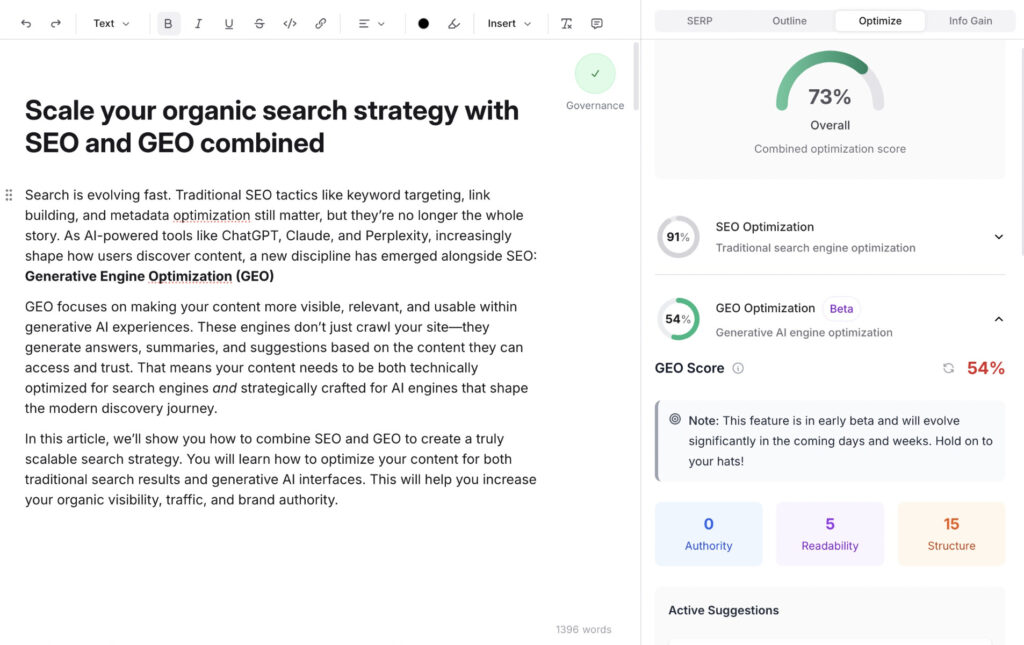
What I Like
Its content brief and outline generation are outstanding. You can type in a keyword, and within seconds, you get competitor headings, related questions from Quora or Reddit, and the core topics you should cover. I’ve also found the AI-powered workflows really helpful for brainstorming or beating writer’s block, especially the ability to generate draft sections or rephrase clunky sentences.
The Google Search Console integration is another good point, since it helps identify which of your existing articles are losing traction and need refreshing. For me, Frase is an all-in-one workspace.
What I Dislike
For straightforward topics, it does well, but when it comes to niche or technical subjects, the output is often not very good. You definitely need editing.
Frase is not a complete SEO suite. You won’t get backlink analysis, site audits, or advanced keyword metrics here, so pair it with another tool.
5. MarketMuse
MarketMuse is a go-to choice for content teams. It evaluates your entire content library and competitive landscape, giving you a data-backed roadmap to build topical authority and long-term visibility.
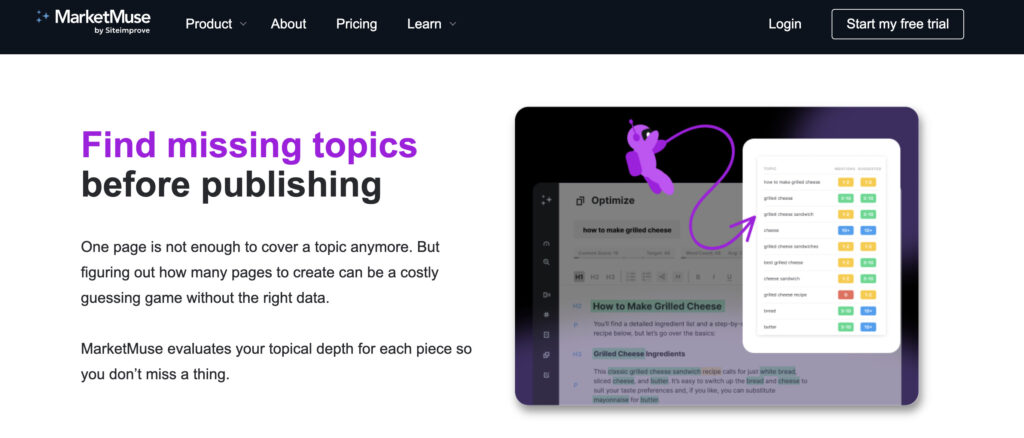
What I Like
MarketMuse offers advanced AI-driven topic modeling. It identifies topic clusters, semantic relationships, and content gaps that you wouldn’t have spotted on your own. The content inventory analysis is great. By connecting to Google Search Console, it highlights underperforming pages and opportunities to update content.
I also love the detailed content briefs it generates. These briefs give everything they need: subtopics, questions, and target word counts. The personalized difficulty scores are especially helpful.
What I Dislike
The price point is steep, which makes it out of reach for many freelancers and smaller teams. It’s clearly built with agencies and enterprise-level users in mind.
There’s also a learning curve. The platform can feel overwhelming with so many reports and features. Besides, MarketMuse doesn’t have a broad keyword database. There’s also no backlink analysis, technical SEO auditing, or AI writing.
Expert opinion
Optimize your content not just for search engines but also for AI platforms like SearchGPT and ChatGPT, social media platforms like Instagram, and other platforms like podcast sites and app stores.

Co-Founder at Neil Patel Digital
Conclusion
The global SEO market was valued at USD 89.1 billion in 2024 and is expected to grow to USD 143.9 billion by 2030. The current list of tools already offers everything you need for SEO content optimization. With smarter features, these platforms give you the edge to refine your content strategy and dominate the search rankings.
Frequently Asked Questions




